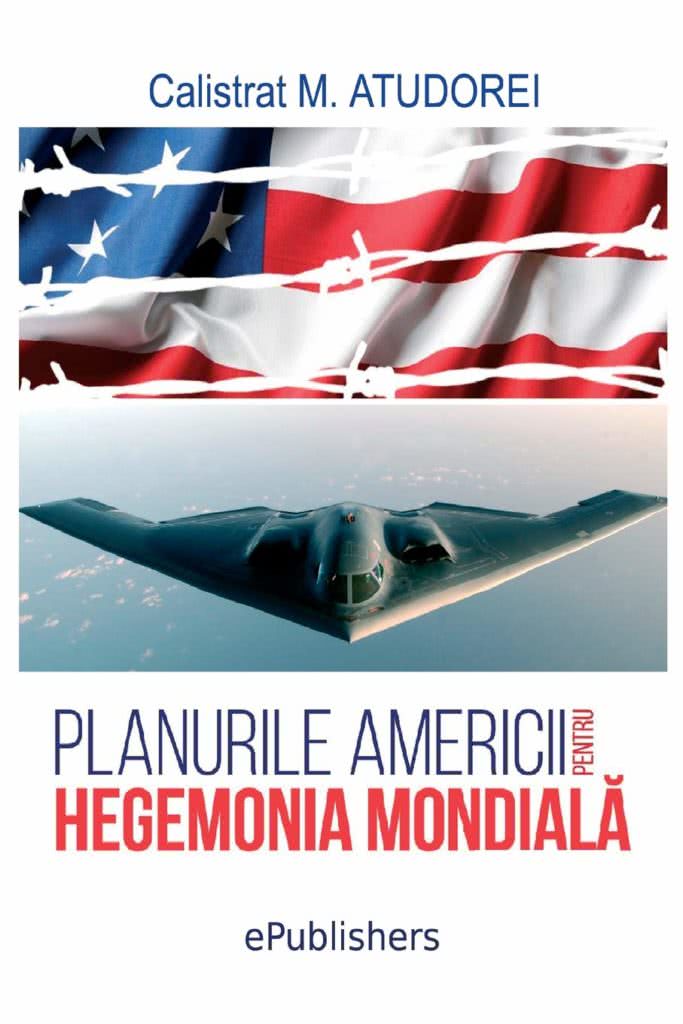Author: Radu Toma – 30/072019
Brief thoughts on Atudorei M. Calistrat’s ”America’s Plans for World Hegemony”
This is the first book ever written in Romania, by a Romanian and in Romanian language on US history both domestic and international and its evolutionary destiny towards the hegemonic superpower of today’s world.
We welcome it. The Author deserves our admiration for his daring, relentless and scholarly endeavour.
With shadows and lights, mostly shadows, the book acidly tells us a story of the rise and decline of one of the greatest empires ever. And surely the most prominent empire, as the existing one in our life time.
Abruptly, from the third paragraph of the Introduction the Author, a newcomer on the geopolitical market shocks the reader as he quotes highly qualified American sources and concludes that “the US is no longer a truly democratic state, but one led by oligarchy, an ‘Elite’ that no longer represent the will of the population”. He also reveals to the same geopolitically uneducated Romanian public the existence of the US “Military-industrial complex”, the Deep State, the Financial Cartel etc. He unveils an America in the twilight zone of secretive planning and leadership, strictly controlled global institutions, wars and neocolonialism in the Middle East, Latin America and East Europe, and of 75 years of Soviet Union/Russia incisive and limitless budgeted strategies of confrontation.
A strange coincidence struck me as Mr. Atudorei’s book came along with a thunderous outburst of well reputed voices deploring or expressing their apathy towards what the politicians, universities and media call “the rise and decline of US hegemony”. As I mentioned the spirit of this book as one of cool criticism, this coincidence rightfully impressed me, indeed. Mr. Atudorei’s gloomy “finding fact mission” is consistently sustained, let’s call it so, by a “conclusion and solution finding mission” of the above mentioned experts. Some bluntly consider that the American exceptionalism in terms of its economic and military power should focus on sharing the provision of the global public goods, particularly “power” with the others. There is a larger and larger reaction against the Wilsonian interventionism, some were questioning the post WW2 order, and John Mearsheimer argued that liberal democracy is not an export item.
Talking about the historical US decline as things evolve show that a gradual, long-term erosion is probably a more fitting scenario than sudden collapse: the United States have a large population that is reproducing at a steady rate, a resource-rich landmass and a powerful military, and still dominates the list of Nobel Prize winners. Adopting a more restrained grand strategy can be a prudent step in mitigating this possibility of remaining at the head of the table, and prolonging America’s historical moment. But, ignoring this mild vision of US historian Paul Kennedy on America’s safe landing I can testify that whatever I witnessed five or six decades ago, that the United States was confidently leading the world into what was supposed to be a new millennium of peace, prosperity, and freedom, now is heading into turbulence. That the decline appears inevitable. That the US post–Cold War hegemony—rising from the fall of the Berlin Wall in 1989 to the fall of Baghdad in 2003, is sinking ever since. That the world is on a head-on collision with a new era of customized democracies and personalized authoritarianism. That the apotheosis of neoliberalism and the push for globalization produced greater economic integration between countries but also led to a populist backlash. That the liberal hour is ending in the West, the populists want their countries back, and the day of nationalists has come.
That many believe Fortress America is crumbling.
However, when it comes to daily life it seems that Trump Administration is not prepared to give away any of US’ hegemonic privileges and to accept new and multiple great power spheres of influence. Trump and his foreign policy people are unwilling to cede to Beijing and Moscow dominance in Asia or Eastern Europe. He may periodically wonder why America should keep troops and peace in those places, but he has authorized freedom of navigation exercises in the South and East China Seas and the Black Sea and troops to deter the Russians vis-à-vis of Poland and the Baltics.
Meanwhile, in some places a new and legitimate problem rises, that of Russia and China exposing value propositions more attractive than America’s. Mr. Putin’s latest resounding interview with The Financial Times of London on the extinction of world liberal order, his Round 1 KO victory in a match against pop-rock superstar Elton John on biblical values, Christianity and children’ immunities and untouchable rights, and recent lecture on universal values by Mr. Xi Jiping („We should hold up equality and respect, abandon pride and prejudice, deepen our knowledge about the differences between our own and other civilizations, and promote harmonious dialogue and coexistence between civilizations”) could be considered flagships and prove that Moscow and Beijing appear each to have new narratives for the world. It is the same world Mr. Trump has no new narrative for.
And after all let’s not forget that the fate of the Universe doesn’t depend on American hegemony.

Article reproduced by kind permission of Flux Ştiri şi Analize‘s Editor – source: Flux Ştiri şi Analize

Radu Toma, romanian emeritus professor (University of Bucharest)
